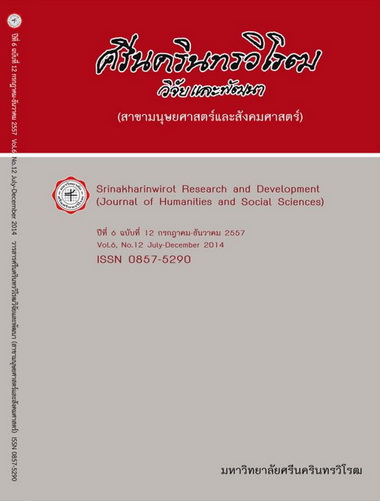กิจการเพื่อสังคมในระบบตลาดเป็นฐานเพื่อผลตอบแทนทางสังคมต่อการลงทุนที่ยั่งยืน (SOCIAL ENTERPRISE IN MARKET-BASED SYSTEM FOR SUSTAINABLE SOCIAL RETURN ON INVESTMENT)
Keywords:
Social Enterprise, Social Mission, Social Innovation, Social ImpactAbstract
บทคัดย่อบทความนี้เป็นส่วนหนึ่งของการวิจัยที่มีวัตถุประสงค์เพื่อศึกษาถึงปัจจัยแวดล้อมและเงื่อนไขที่จะสนับสนุนความสำเร็จของการดำเนินงานของกิจการเพื่อสังคมที่อยู่ภายใต้บริบทของระบบตลาดเป็นฐาน ให้สามารถสร้างผลตอบแทนการลงทุนทางสังคมอย่างยั่งยืน โดยได้มีการพัฒนาตัวแบบมโนทัศน์ซึ่งแบ่งออกเป็น ตัวแบบสมการโครงสร้างเชิงเส้นและตัวแบบการวัดเพื่อใช้เป็นกรอบในการศึกษา ภายในตัวแบบได้แสดงถึงปัจจัยสำคัญแห่งความสำเร็จ 3 ประการ คือ ภารกิจเพื่อสังคม นวัตกรรมสังคม และผลกระทบทางสังคม ทั้งนี้เมื่อนำตัวแบบดังกล่าวไปทำการศึกษาด้วยวิธีการ 3 วิธี คือ การสัมภาษณ์เชิงลึก กรณีศึกษา และทดสอบค่าทางสถิติ ผลสรุปคือ ตัวแบบที่พัฒนาขึ้น มีความสอดคล้องกับข้อมูลจากการศึกษาตามความเห็นผู้เชี่ยวชาญ ตามกรณีศึกษา และตามข้อมูลเชิงประจักษ์ทางสถิติ ทั้งนี้กลุ่มตัวอย่างที่ใช้ในการศึกษา ในกรณีของการสัมภาษณ์เชิงลึก จะเป็นผู้เชี่ยวชาญทั้งด้านการสนับสนุนการพัฒนากิจการเพื่อสังคมในประเทศไทย ทั้งในภาครัฐ ภาคเอกชน และภาคประชาชน ส่วนกลุ่มตัวอย่างในการศึกษาแบบกรณีศึกษาและการทดสอบค่าทางสถิตินั้น เป็นผู้เกี่ยวข้องที่อยู่ในกิจการเพื่อสังคมในประเทศไทย 3 แห่ง คือ โครงการพัฒนาดอยตุง บริษัทซูพรีม รีนิวเอเบล เอ็นเนอร์ยี่ จำกัด และบริษัทเครือข่ายนวัตกรรมชาวบ้าน จำกัด
Abstract
This paper is part of research with objective to study factors and conditions which embody success into the business conduct of social enterprises in the context of market-based systems. As a result, social enterprises will have capabilities to generate sustainable social return on investment. In order to conduct the study, conceptual models have been developed to be frameworks for the study and the models comprise of structure equation model and measurement model. The conceptual models constitute three critical success factors, i.e. Social Mission, Social Innovation and Social Impact. The study uses three methods in order to validate models, i.e. in-depth interview, case study and statistical testing. The results of the study validate the fitness of the models according to the analysis of opinion from experts, the analysis of case studies and the statistical testing from the empirical data. In case of in-depth interview study, sample is a group of expert working in promoting and developing social enterprises in Thailand from three sections, which are public sector, private sector and people sector. In case of case study and statistical testing, sample is from stakeholder group of three case studies, i.e. Doi Tung Development Project, Supreme Renewable Energy Co., Ltd. and Grassroot Innovation Network Co., Ltd.
Downloads
Downloads
Published
How to Cite
Issue
Section
License
Srinakharinwirot Research and Development Journal of Humanities and Social Sciences is licensed Under a Creative Commons Attribution-NonCommercial-NoDerivs 4.0 International (CC-BY-NC-ND 4.0) License, Unless Otherwise Stated. Please Read Journal Policies Page for More Information on Open Access, Copyright and Permissions.



